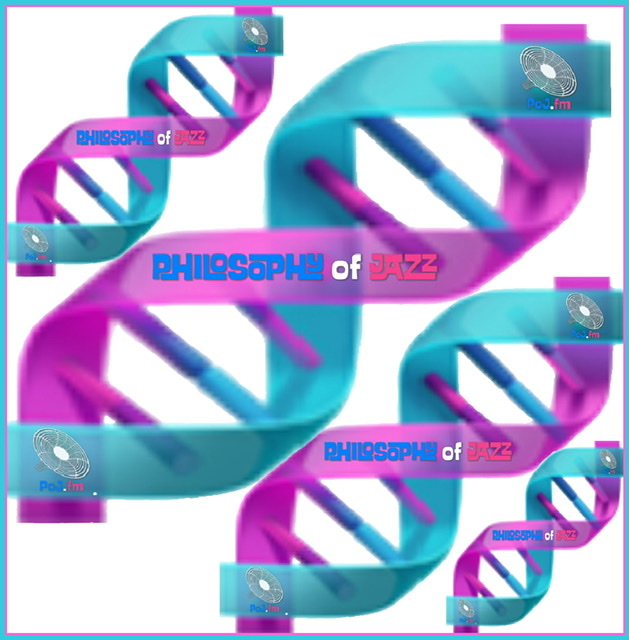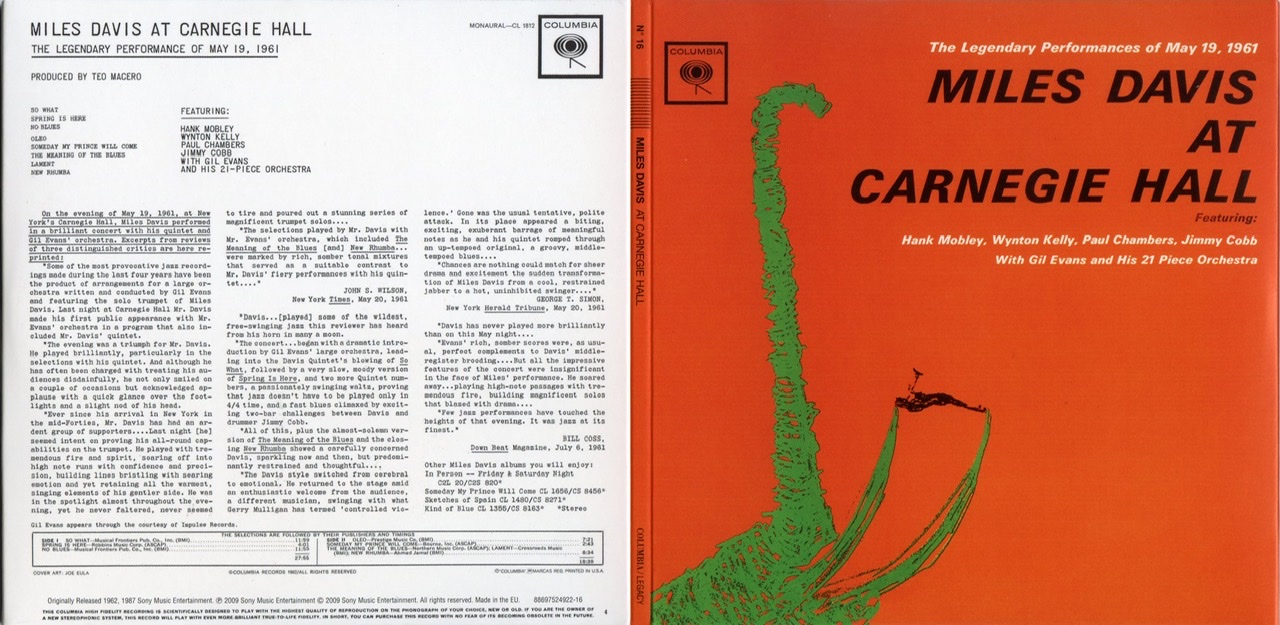"What is Your Musical DNA?
Discussion[edit]
What Constitutes Your Musical DNA? by David Scardino[edit]
- Introduction: “What are the ten albums that make up your musical DNA?”
- That was the challenge posed to me by my buddy, Hagop Najarian, holder of the prestigious Art Van Damme chair in advanced jazz accordionistics, on both his Facebook page and mine. Here’s my answer, albeit not quite completely on-point as I found the concept of albums a bit too constricting. Instead, I went with ten individual tracks plus a very personal eleventh. Each reaches me on an emotional level that words can approximate, but never completely capture. Still, we have to try.
- So, as jazz immortal Art Blakey used to say, “We sincerely hope you enjoy . . . ”
- (NOTE: Click on "Song Title" to right of DNA to see and listen to YouTube.com video of that song. Underneath, you can click on a musician's name or a song title for more information about it from PoJ.fm or Wikipedia or elsewhere.)
- Not only did he teach the world how to swing, but every time Armstrong played or sang, you heard the sound of genius and while this 1931 arrangement is typical of the time, i.e., corny, Louis’s timeless playing and singing blows it deep into the shadows.
- Also available on multiple Sony/Columbia compilations including “The Definitive Louis Armstrong” and “Portrait of the Artist As A Young Man.”
![]() Duke Ellington's "Daybreak Express"
Duke Ellington's "Daybreak Express"
- Although Ellington led the ultimate band of soloists, this 1933 track is totally through-composed and I’m not sure has ever been equalled. Almost ninety years later its unqualified brilliance still amazes. (It was also the soundtrack for D. A. Pennebaker’s 1953 short film of the same name).
- Also available on the compilation “Early Ellington (1927-1934) on RCA Victor. The Pennebaker film is available on YouTube (but be advised the track is somewhat “revised” to fit the requirements of the film).
![]() Lester Young's "Lester Leaps In"
Lester Young's "Lester Leaps In"
- From September of 1939, the tune that would become Lester’s theme song for the rest of his life, is done here with “The Kansas City 7,” a small group from within the Count Basie band. It’s all Lester from beginning to end and shows just how great an improviser he was and what an inspiration he was for Charlie Parker. His playing is sublime, as is Basie’s accompaniment.
- Also available in numerous compilations on Sony/Columbia, Mosaic and Past Perfect.
![]() Duke Ellington featuring Ben Webster: “Star Dust”
Duke Ellington featuring Ben Webster: “Star Dust”
- Duke Ellington featuring Ben Webster: “Star Dust”
- Ben Webster is the stylistic link between Coleman Hawkins and Lester Young and here, as with most of his ballad playing, you get more Hawk than Lester. (With up tempo numbers it was usually the reverse.) Whatever, this is Big Ben all the way and is simply stunning. Add in that it was recorded live during the last set in a Fargo, North Dakota ballroom on a wire recorder in 1940, and it is miraculous. (And also very different from Armstrong’s version above.)
- Also available on Storyville’s “The Duke Box” (where the entire Fargo recordings occupy Discs 2 and 3).
- No jazz list would be complete without Charlie "Bird" Parker. He was at once a hero musician and a tragic figure, but here, in 1953, is one of his best quartets—Al Haig on piano, Percy Heath on bass, Max Roach on drums—doing an original composition that, according to Roach, Bird dashed off in Max’s kitchen. In any case, this is what a musician friend of mine termed “prime Bebop,” an interesting line to blow on with everyone just going for it—a definition of the improviser’s art.
- Also available on “The Complete Charlie Parker on Verve,” in a bunch of takes including quite a few fragments. The master, ultimately issued, was take 6.
![]() Miles Davis (& Hank Mobley) with Gil Evans: “So What”
Miles Davis (& Hank Mobley) with Gil Evans: “So What”
- Miles Davis (& Hank Mobley) with arrangements by Gil Evans: “So What”
- Columbia skipped the album notes and simply reprinted several rave reviews of this 1961 Carnegie Hall concert on the back of the original album.
- The large Gil Evans ensemble, playing an orchestration of Bill Evans’s original introduction on the “Kind of Blue” album, opens out of tempo, then comes in a beat or so early, but the remaining eleven minutes and forty-five seconds are electric and while Miles is great, for me, Hank Mobley’s solo, squeaky reed and all, is beyond great.
- Also available on “Miles Davis Live at Carnegie Hall” on Sony/Columbia.
- Another live performance, this time from the classic Coltrane quartet. Trane’s long solo, mostly backed by just Jimmy Garrison’s bass and Elvin Jones’s drums, is an emotional rollercoaster that will take you high, dump you low, and wring you inside and out. By the time McCoy Tyner’s piano slips back under Trane for the final chorus (joined by Eric Dolphy’s alto), you’ll feel like you’ve taken the journey of your life.
- Also available on Impulse “Coltrane - The Complete 1961 Village Vanguard Recordings.”
- Note: there are three versions of “Impressions” in this box, the one referenced here is the third, recorded Friday, November 3rd 1961.
- This band—Evans, piano, Scott LaFaro, bass, Paul Motian, drums—recorded live at the Village Vanguard in June of 1961, revolutionized the jazz piano trio, in the process changing the very sound of the genre. The tune here is a LaFaro composition and the band is at the top of their form, which is high indeed. Tragically, this would be their final engagement as LaFaro was killed in an automobile accident ten days later.
- Also available on several Fantasy/Riverside compilations; originally issued on Bill Evans Trio: “Sunday at the Village Vanguard.”
![]() Dizzy Gillespie & James Moody: “I Can’t Get Started/‘Round Midnight”
Dizzy Gillespie & James Moody: “I Can’t Get Started/‘Round Midnight”
- A medley of bebop warhorses twenty years later from one of the creators of the genre and one of its greatest soloists. The cut also features luminous work from altoist James Moody. It’s all totally transportive. A young Kenny Barron is on piano along with Chris White on bass and Rudy Collins on drums.
- Also available on Verve Master Editions: “Something Old, Something New.”
![]() Thad Jones/Mel Lewis Big Band: “St. Louis Blues”
Thad Jones/Mel Lewis Big Band: “St. Louis Blues”
- The band that kicked off Monday nights at the Village Vanguard on February 7th, 1966 is pretty much intact here, two-and-a-half years later, and continues to this day (COVID-19 excepting) as The Village Vanguard Orchestra. Recorded live, trombonist/arranger Bob Brookmeyer, like Thad and Mel, a veteran of Gerry Mulligan’s Concert Jazz Band, takes W. C. Handy’s early 20th Century tune and completely reimagines it for the first part of the late 20th Century . . . and it holds up well into the 21st.
- Also available on BGO Records “Monday Night/Central Park North.”
![]() Cannonball Adderley: “Jeannine”
Cannonball Adderley: “Jeannine”
- This 1960 track is a bonus pick and it’s personal. It was the middle of a day when I was at the bottom of my own personal barrel and then this exploded out of my car radio and blew my blues away. If there was this kind of beauty and perfection in the world, and I was lucky enough to be able to enjoy it, then things couldn't be anywhere near as bad as I thought. The tune, written by the great Duke Pearson, moves like a bandit and all the solos—Cannon on alto, brother Nat on cornet, Barry Harris on piano and Sam Jones on bass, all backed by “the original drum machine,” Louis Hayes—are Grade A1! A true joy.
- Also available on Capitol Records “Them Dirty Blues.”

